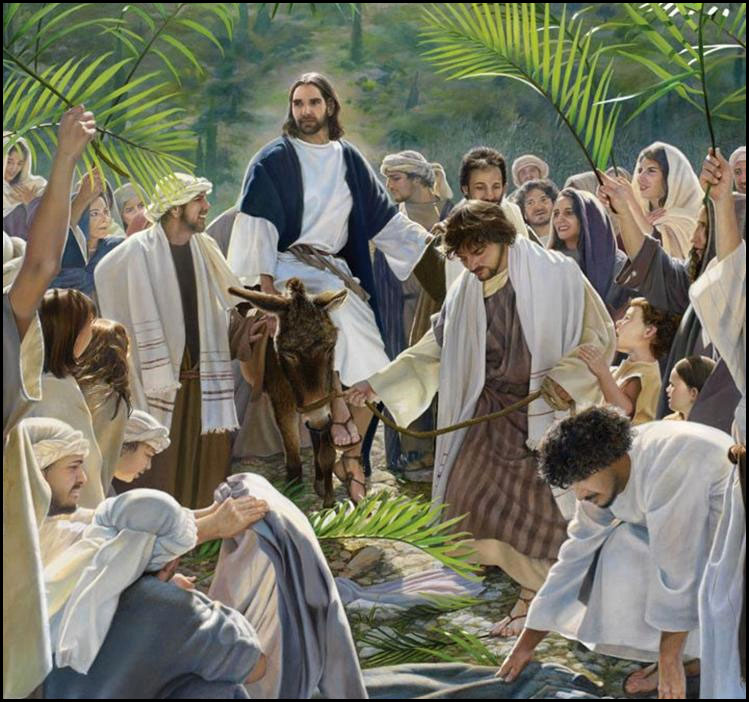
As the young colt walked slowly down the side of the Mount of Olives, the crowds began to gather in great numbers. Many had anticipated the coming of Jesus to the city of Jerusalem for the feast of Passover; for they had hopes that he was the promised Messiah. The Lord looked out over the masses that thronged the path that led to the Gate Beautiful and he smiled as he approached the large stone gate. Robes and branches had been strewn across his path that even the hoof of his animal might not touch the bare ground. As Jesus rode in the midst of the crowd they began to wave cut palm branches and shout “Hosanna to the Son of David.” The hundreds of waving branches appeared as an endless sea that swayed in the breeze. Little did they know that within the week this same Messiah would be scourged and crucified on a cross. (See John 12:12-15)
When Jesus entered Jerusalem a week before His crucifixion, He entered as a king and a ruler. The day was Sunday, the day after the Jewish Sabbath. Entering on a donkey, He rode as David and Solomon did of old. To enter on a horse would mean He entered as a conqueror, taking the city by force. Entering on a donkey meant he entered in peace, showing he would conquer all things not by compulsion or force, but by love and long suffering. Like this animal that only lived to serve its master, so Jesus only lived and died that we might have life. He, like this animal, submitted His will completely to the Father.
The waving of the palm branches, as part of the triumphal entry, and the shouting of hosanna is significant in that this same ritual was done during the Feast of Tabernacles. This feast, which is celebrated during the fall of each year, was to commemorate the wandering of Israel in the wilderness and the eventual entering into the Promised Land. Later, however, this feast also took on new meaning with the coronation of the kings of Israel, and the dedication of the Temple of Solomon (2 Chronicles 7:8-9).
Thus, Jesus was being welcomed as a King of Israel, the King of Kings, and the Lord of Lords. This act of worship by the Jews fulfilled the prophecy of Zechariah which stated: “Rejoice greatly, O daughter of Zion; shout, O daughter of Jerusalem: behold, thy King cometh unto thee: he is just, and having salvation; lowly, and riding upon an ass, and upon a colt the foal of an ass.” (Zechariah 9:9). The people were expecting a kingly messiah, and thus when Jesus allowed them to honor Him in this manner, they must have thought that He would free them from their Roman captors. However, they did not understand that though He would come as a political Messiah to free man from all earthly powers, He first would come to free them from a greater captivity of sin and death.
Often we are placed with the question that these Jews had to ask themselves. What type of Messiah are we waiting for? What type of freedom will he bring us? When we try to imagine up a god that does not truly represent the Lord, in essence we create our own god and place this personal creation above the true God of earth. When we do this, we lose sight of the true power and meaning of the atonement and thus lose access to His grace. For it is only after we understand who Christ is that we can practice faith in Him. For without a correct knowledge of God we cannot know what power He has, or what we can expect of Him. We cannot place faith in something we do not understand.
In regards to the dedication of the temple during the Feast of Tabernacles, it is significant that on this same day, Jesus would come into the temple and cleanse it, and make it His own. Thus, He would be welcomed into the city as King, and then come into His house and cleanse it and sanctify it for His work. We likewise, must allow the Savior to come into our lives and cleanse our “temples” of all that is impure. If we resent His actions, like those of the Jewish leadership, we too will have our “temples” destroyed and burned. If we, like the disciples, allow Him to cleanse us and make us pure, we will become great men and women who can literally change the course of mankind.
Each of us has the opportunity to accept or reject the Messiah. We can welcome Him with praises of Hosanna, with lying down of our all before Him, or we can reject His teachings and strive to thwart His mission. By learning to follow Him and learn of His true mission, attributes and power, we are enabled to gain His same power and then become at-one with Him. Only then can the atonement of Christ cleanses us and purify us, only then can we be whole.
No comments:
Post a Comment
Note: Only a member of this blog may post a comment.